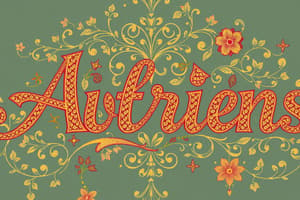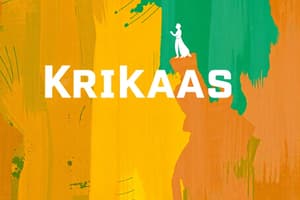Podcast
Questions and Answers
What is the typical structure of a sentence in Afrikaans?
What is the typical structure of a sentence in Afrikaans?
- Object-Subject-Verb (OSV)
- Subject-Verb-Object (SVO) (correct)
- Subject-Object-Verb (SOV)
- Verb-Subject-Object (VSO)
All Afrikaans nouns are neuter.
All Afrikaans nouns are neuter.
False (B)
What is the Afrikaans word for 'water'?
What is the Afrikaans word for 'water'?
water
The plural of 'huis' is ______.
The plural of 'huis' is ______.
Match the following days of the week in Afrikaans with their English equivalents:
Match the following days of the week in Afrikaans with their English equivalents:
Which of the following is a correct verb formation in Afrikaans for past tense?
Which of the following is a correct verb formation in Afrikaans for past tense?
The Afrikaans word for 'friend' is 'vriend'.
The Afrikaans word for 'friend' is 'vriend'.
What does 'Ek verstaan nie' mean in English?
What does 'Ek verstaan nie' mean in English?
The comparative form of 'groot' (big) is ______.
The comparative form of 'groot' (big) is ______.
Which Afrikaans phrase means 'Do you speak Afrikaans?'
Which Afrikaans phrase means 'Do you speak Afrikaans?'
Flashcards
SVO Order
SVO Order
Afrikaans follows a Subject-Verb-Object sentence structure.
Noun Gender
Noun Gender
Nouns are either common (de and die) or neuter (die). This affects article usage.
Forming Plurals
Forming Plurals
Plurals are typically formed by adding '-e' or '-s' to the end of the word.
Possessive Pronouns
Possessive Pronouns
Signup and view all the flashcards
Present Tense Verbs
Present Tense Verbs
Signup and view all the flashcards
Past Tense Verbs
Past Tense Verbs
Signup and view all the flashcards
Future Tense Verbs
Future Tense Verbs
Signup and view all the flashcards
Hello
Hello
Signup and view all the flashcards
Dankie
Dankie
Signup and view all the flashcards
How are you?
How are you?
Signup and view all the flashcards
Study Notes
Afrikaans Study Notes
Grammar
-
Basic Structure:
- Subject-Verb-Object (SVO) order.
-
Nouns:
- Gender: Nouns are either common (de and die) or neuter (die). Gender affects article usage.
- Plurals:
- Typically formed by adding '-e' or '-s'.
-
Pronouns:
- Personal Pronouns: ek (I), jy (you), hy (he), sy (she), dit (it), ons (we), julle (you all), hulle (they).
- Possessive Pronouns: my (my), jou (your), sy (his), haar (her), ons (our), julle (your), hul (their).
-
Verbs:
- Present Tense: Regular verbs usually end in -e (e.g., speel - to play).
- Past Tense: Often formed by adding 'ge-' before the verb stem (e.g., gespeel - played).
- Future Tense: Formed using “sal” + verb (e.g., sal speel - will play).
-
Adjectives:
- Typically follow the noun they modify.
- Most adjectives do not change form, except for the comparative and superlative (e.g., klein - small; kleiner - smaller; die kleinste - the smallest).
Vocabulary
-
Common Greetings:
- Hello: Hallo
- Goodbye: Totsiens
- Please: Asseblief
- Thank you: Dankie
-
Basic Numbers:
- 1: een
- 2: twee
- 3: drie
- 4: vier
- 5: vyf
-
Days of the Week:
- Monday: Maandag
- Tuesday: Dinsdag
- Wednesday: Woensdag
- Thursday: Donderdag
- Friday: Vrydag
- Saturday: Saterdag
- Sunday: Sondag
-
Essential Vocabulary:
- Water: water
- Food: kos
- House: huis
- Friend: vriend
-
Common Phrases:
- How are you?: Hoe gaan dit?
- I don’t understand: Ek verstaan nie.
- Do you speak Afrikaans?: Praat jy Afrikaans?
-
Colors:
- Red: rooi
- Blue: blou
- Green: groen
- Yellow: geel
- Black: swart
- White: wit
These notes capture essential aspects of Afrikaans grammar and vocabulary, providing a foundation for further study or practical use.
Grammar Basics
- Afrikaans follows a Subject-Verb-Object (SVO) word order, similar to English.
- Nouns in Afrikaans have grammatical gender, which impacts the use of articles. There are two genders:
- Common Gender: Uses the articles "de" and "die" (e.g., de hond - the dog).
- Neuter Gender: Uses only the article "die" (e.g., die huis - the house).
- Plural nouns are generally formed by adding "-e" or "-s" to the singular form. (e.g., hond - dog, honde - dogs).
- Afrikaans pronouns are diverse and include:
- Personal Pronouns: "ek" (I), "jy" (you), "hy" (he), "sy" (she), "dit" (it), "ons" (we), "julle" (you all), "hulle" (they).
- Possessive Pronouns: "my" (my), "jou" (your), "sy" (his), "haar" (her), "ons" (our), "julle" (your), "hul" (their).
Verbs
- Present tense verbs in Afrikaans typically end in "-e" (e.g., speel - to play).
- The past tense of a verb is often created by adding "ge-" before the verb stem (e.g., gespeel - played).
- The future tense is formed using "sal" + the verb (e.g., sal speel - will play).
Adjectives
- Adjectives in Afrikaans generally follow the noun they modify.
- Most adjectives do not change form; however, they do change in comparative and superlative forms. (e.g., klein - small, kleiner - smaller, die kleinste - the smallest).
Vocabulary
- Common Greetings: "Hallo" (Hello), "Totsiens" (Goodbye), "Asseblief" (Please), "Dankie" (Thank you)
- Basic Numbers: "een" (1), "twee" (2), "drie" (3), "vier" (4), "vyf" (5)
- Days of the Week: "Maandag" (Monday), "Dinsdag" (Tuesday), "Woensdag" (Wednesday), "Donderdag" (Thursday), "Vrydag" (Friday), "Saterdag" (Saturday), "Sondag" (Sunday)
- Essential Vocabulary: "water" (water), "kos" (food), "huis" (house), "vriend" (friend)
- Common Phrases: "Hoe gaan dit?" (How are you?), "Ek verstaan nie" (I don't understand), "Praat jy Afrikaans?" (Do you speak Afrikaans?)
- Colors: "rooi" (red), "blou" (blue), "groen" (green), "geel" (yellow), "swart" (black), "wit" (white)
Studying That Suits You
Use AI to generate personalized quizzes and flashcards to suit your learning preferences.




